Ex-MP Fears Embarrassment In Hosting Asian Champions League
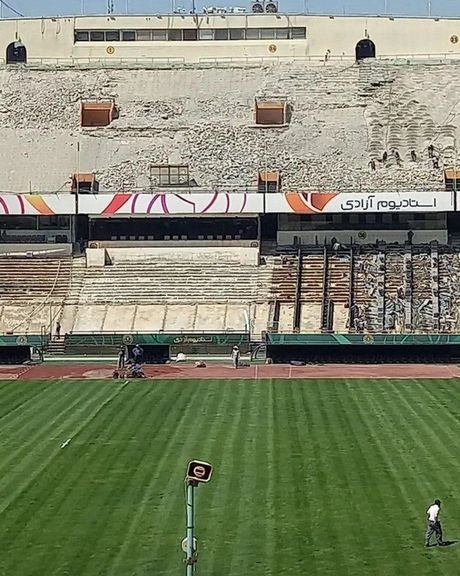
A former member of the Iranian parliament voiced apprehensions regarding the dilapidated state of Azadi Stadium ahead of the upcoming Asian Champions League.

A former member of the Iranian parliament voiced apprehensions regarding the dilapidated state of Azadi Stadium ahead of the upcoming Asian Champions League.
Ali Motahari raised questions about whether the country's sports authorities were adequately prepared for the tournament which will bring iconic players including Cristiano Ronaldo. While the prospect of football superstars gracing Iranian soil has generated excitement, concerns have surfaced regarding the condition of the stadium's pitch and its facilities.
Motahari stressed the need to ensure that Azadi Stadium and the VAR system are fully operational to prevent last-minute complications that could potentially tarnish the country's reputation on the international stage.
A few days ago, the official Persian X account of the Saudi Arabian government announced that the Al-Nassr team would be hosted at Azadi Stadium. However, the choice of accompanying photos in the message triggered a significant debate as it spotlighted the deteriorated state of the stadium's stands, indirectly critiquing its overall condition.
The 78,000 capacity Azadi Stadium, home to the Iranian national football team, has grappled with maintenance challenges for over a decade. Originally inaugurated as Aryamehr Stadium by Mohammad Reza Shah Pahlavi on October 17, 1971, it was constructed to host the 1974 Asian Games and later served as the venue for the 1976 AFC Asian Cup. Since its inauguration in 1971, Iran has not seen the construction of a comparable stadium.
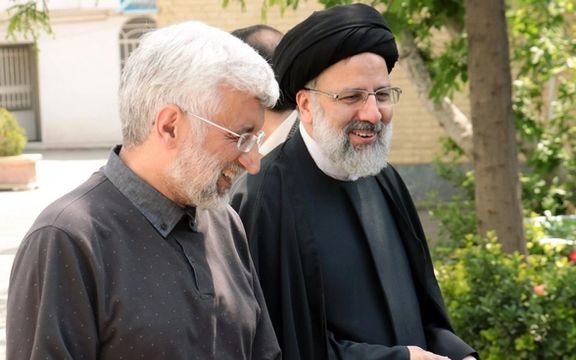
As the March parliamentary elections in Iran approach, many politicians protest political “purification” efforts by ultraconservatives aimed at monopolizing power.
Even some conservative figures previously branded as hardliners, including Expediency Council member Mohammad Javad Bahonar, expressed concern about the aggressive purging efforts by ultraconservatives, not only within the government but also in academic institutions.
Reformist cleric Hossein Ansari Rad, who served in the parliament in the 1980s, has bitterly said in an interview with Rouydad24 that the advocates of political purification prefer to have a bunch of non-experts around them rather than professional elites.
He also criticized the government for dismissing university professors and replacing them with unqualified individuals. In addition, Ansari Rad criticized the government's economic policies, stating that instead of functioning as a welfare state, it has created a nation of 80 million people reliant on government handouts to make ends meet.
He expressed regret that despite possessing valuable resources like oil and natural gas, Iran now grapples with severe poverty, pushing the country to the brink of collapse.
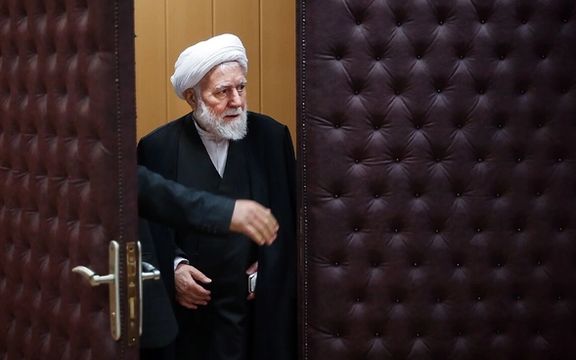
Nonetheless, Ansari Rad reiterated that advocates of political purification represent a minority within the government, attempting to monopolize political power in Iran for decades.
He recalled a time when Iran had wise leaders in positions of power and warned that the country is heading toward a deadlock. Currently, the nation's economic and foreign policy situations are so dire that countries like Oman and Qatar have to assist Iran and mediate with the U.S. to pursue Iran's interests.
Meanwhile, in an interview with Nameh News conservative commentator Mohammad Mohajeri said that former parliamentary speaker Ali Larijani was a victim of political purification during the 2021 presidential elections when the Guardian Council refused to endorse his qualifications as a candidate, although he is an experienced conservative who has served in many executive positions since the 1990s.
He added that both of Iran's leading political factions have promoted the idea of their own camp since 1979 whenever they gained dominance in the Iranian political landscape. However, the monopolization of power by ultraconservatives began under former President Mahmoud Ahmadinejad and has persisted since then. Mohajeri reiterated that, in fact, "Ahmadinejad was one of the architects of the concept of political purification."
He also emphasized the role of President Ebrahim Raisi's ultraconservative adviser, Saeed Jalili, as one of the masterminds behind political purification. He pointed out that Jalili is a powerful figure, actively involved in both the actual government and the shadow government. Mohajeri also named former Majles Speaker Gholam Ali Haddad Adel as a conservative figure who has played a pivotal role in purging critics and opponents from the establishment.
In another development, former Prosecutor of the Revolutionary Courts in Iran, Ayatollah Seyyed Hossein Mousavi Tabrizi told Rouydad24 that "Those who claim to be revolutionaries harm the trust between the people and government (regime) and make the country's situation volatile."
Tabrizi, currently serving as the secretary of the Seminarians Association in Qom, expressed his desire, saying, "I hope that radicals on both sides of Iran's political spectrum will leave the people alone as we approach the election time." He also recommended that the Guardian Council refrain from harshly disqualifying candidates, as this could harm the system and lead people to believe that certain groups intend to reserve all Majles seats for insiders.
"Ruthless disqualifications provide no incentive for voters to participate in the elections, and the Guardian Council should be held responsible for the resulting consequences," cautioned Mousavi Tabrizi. He added, "By abstaining from the previous round of elections, voters conveyed the message that no individual or organization should make decisions on behalf of the people."
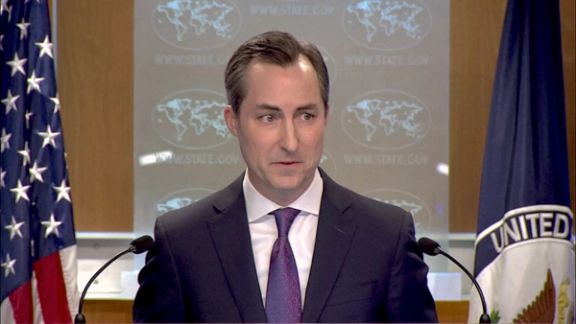
The US Department of State raised concerns about the Iranian regime's ongoing intimidation of the families of slain protesters and journalists.
Spokesman Matthew Miller noted on Thursday that this marks the fourth time in the last two weeks that Mahsa Amini's father has been summoned for questioning by the Iranian authorities.
He stated, "The world is watching its treatment of these families and the ongoing intimidation of journalists and abuse of peaceful protesters, and we will continue to watch it closely and take whatever steps are appropriate to respond to it."
The comments come in the wake of the recent release of approximately $6 billion in Iranian assets frozen abroad by the US government. This release is part of a larger deal that includes the exchange of five US prisoners held in Iran for five Iranians detained by the United States. However, the move has sparked controversy, with many Iranians condemning it as a “ransom payment”.
Notably, the hostage exchange deal left unresolved three other US cases – Jamshid Sharmahd, Afshin Vatani, and Shahab Dalili.
During a hearing before the Foreign Affairs Committee in Congress on Thursday, concerns were raised that the deal does not effectively deter further hostage-taking and allows the Iranian regime to divert resources meant for humanitarian purposes toward security forces, missile programs, and proxy groups. It also threatens to undermine the international sanctions regime.
However, Miller reiterated that the released funds would only be accessible to Iran for humanitarian purposes, such as acquiring food, medicine, and other necessities that directly benefit the Iranian people rather than the regime.
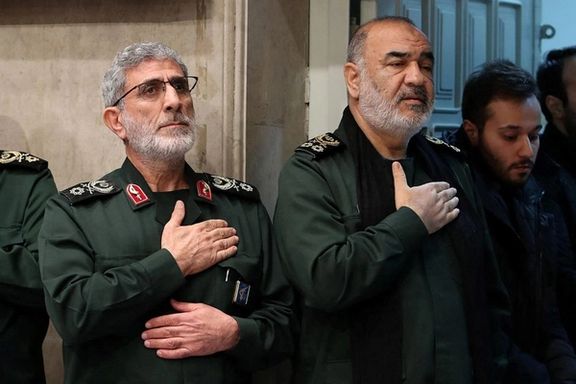
A rare criminal complaint was filed with Paris prosecutors on Thursday, targeting three senior Iranian officials from the regime's security apparatus.
The accusation against IRGC commander Hossein Salami, Intelligence Minister Esmail Khatib, and Quds force commander Esmail Qaani includes "death threats and justifying terrorism."
The six plaintiffs in the case are all exiled Iranians who have been living in France since the 1980s, and include a filmmaker, a journalist, a writer, and an LGBTQ+ rights activist. They have all taken public stances against Tehran, and their complaint, while largely symbolic, coincides with the first anniversary of Mahsa Amini's death last September, which sparked the Woman Life Freedom movement in Iran.
The threats were made in response to support for nationwide protests in Iran following the death of Mahsa Amini in custody of the morality police. One such threat came from Khatib on December 13, where he warned that "anyone playing a role in the riots will be punished, wherever they are in the world."
Additionally, on January 10, Salami himself made a statement regarding "the French people and the managers of [satirical anti-clerical magazine] Charlie Hebdo," suggesting they shouldn't concern themselves with Salman Rushdie's fate. This statement related to the fatwa against Rushdie issued by Iran's late leader Ayatollah Ruhollah Khomeini. The Charlie Hebdo staff had previously been targeted by jihadist gunmen in 2015 for publishing cartoons of the Prophet Mohammed.
Chirinne Ardakani, a French-Iranian lawyer from the Iran Justice Collective, characterized these threats as "disguised fatwas" against Iranian opposition activists worldwide.
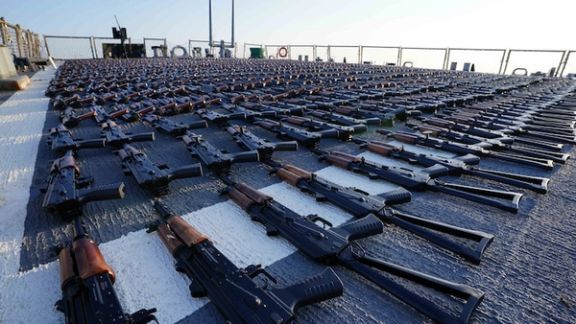
Saudi Arabia invited Yemen's Iran-backed Houthis to Riyadh to continue ceasefire talks, the state news agency SPA reported on Thursday.
The kingdom wanted to resume efforts helped by Oman to "reach a permanent and comprehensive ceasefire in Yemen and a sustainable political solution acceptable to all Yemeni parties," SPA added.
Mohamed Ali al-Houthi, head of the Houthi supreme revolutionary committee, said late Thursday that talks were continuing between Sanaa and the Saudi Arabia with Omani mediation.
The discussions included "paying salaries of the Yemeni employees, opening airports and ports, releasing all prisoners and detainees, the exit of foreign forces, and reconstruction leading to a comprehensive political solution," he said.
The Houthi al-Masirah TV reported earlier on Thursday that a delegation left Sanaa and was on its way to Riyadh to continue the negotiations.
The trip will be the first official visit by Houthi officials to the kingdom since the war broke out in Yemen in 2014, after the Iran-aligned group ousted a Saudi-backed government in Sanaa.
The peace initiatives have gained momentum since arch-rivals Saudi Arabia and Iran agreed to re-establish ties in a deal brokered by China. A permanent ceasefire in Yemen would mark a milestone in stabilizing the Middle East.
The first round of the Oman-mediated consultations between Riyadh and Sanaa, which are running in parallel to UN peace efforts, was held in April when Saudi envoys visited Sanaa.
The group has been fighting against a Saudi-led military alliance since 2015 in a conflict that has killed hundreds of thousands and left 80% of Yemen's population dependent on humanitarian aid.
Reporting by Reuters
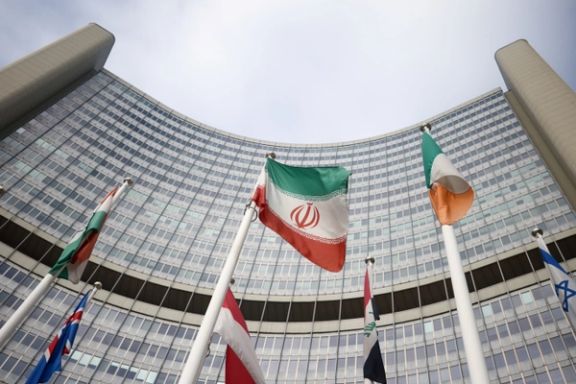
The US and three European allies have warned of another resolution at the UN nuclear watchdog's board in case Iran fails to clarify on uranium traces found at undeclared sites.
Britain, France, Germany -- the so-called E3 -- and the US issued the warning during a quarterly meeting of the International Atomic Energy Agency Board of Governors on Thursday, but they did not specify whether or when they might act on it.
The warning came as the West's standoff with Iran has been complicated by secret US-Iran talks over a prisoner swap agreement and releasing billions of dollars of Iran’s oil revenues frozen in foreign banks due to Washington's sanctions.
A November resolution ordered Tehran to cooperate urgently with the IAEA's investigation into the presence of uranium particles at three undeclared sites, since narrowed down to two.
"If Iran fails to implement the essential and urgent actions contained in the November 2022 Resolution and the 4th March Joint Statement in full, the Board will have to be prepared to take further action in support of the (IAEA) Secretariat to hold Iran accountable in the future, including the possibility of a resolution," the four Western powers said in a statement to the 35-nation IAEA board.
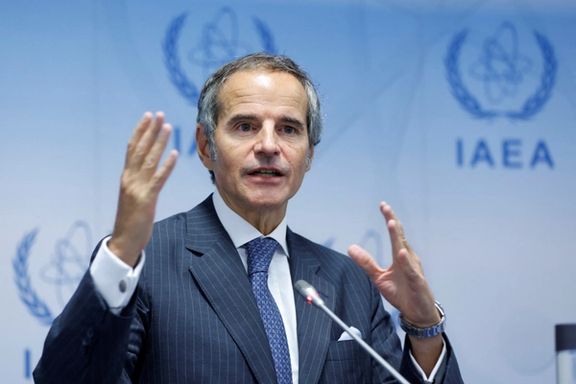
Western powers have recently decried Iran for its lack of cooperation with the IAEA on issues like the re-installation of surveillance cameras removed last year and the enrichment of uranium to levels nearing weapons-grade purity at 60%. However, in parallel, diplomats report that the United States has been engaging in undisclosed "de-escalation" discussions with Iran, potentially complicating matters.
These secretive talks, which Washington has not officially acknowledged, encompass various issues, including Iran's recent reduction in enrichment to 60% purity.
Iran typically reacts to resolutions against it by expanding or accelerating its nuclear activities. Iran maintains that its nuclear program is strictly for peaceful purposes, while Western powers argue that there is no credible civilian explanation for it, particularly uranium enrichment at higher level. The IAEA has never confirmed the peaceful nature of Tehran's nuclear program.
The Thursday joint statement addressed the re-installation of monitoring equipment, such as cameras, but only a fraction of the cameras requested by the IAEA have been installed.
Instead of pursuing another binding resolution against Tehran due to the lack of progress on these issues at this week's IAEA board meeting, Western powers, along with 59 other countries, issued a non-binding joint statement, urging Iran to "act immediately" on various issues, including providing an explanation for the uranium traces.
On the opening day of the IAEA board of governors meeting on September 11, IAEA's Director General Rafael Grossi bemoaned Tehran's failure to respond to IAEA monitoring demands and questions regarding the traces of uranium. He cautioned that his agency is not happy with how relations with Iran progress on the outstanding nuclear issues.
Despite remarks by Grossi, Nasser Kanani, the spokesman for the Iranian Foreign Ministry, said Iran and the IAEA have made “considerable progress” in boosting cooperation based on the March agreement.
“It’s a regret that England, Germany, France and the US, which have certain motivations and positions against Iran, have made Iran-IAEA technical cooperation a subject of their political moves,” he said, adding that the Western states did this in the name of defending the agency and the safeguards, but they aimed to distort the reality of Iran’s sincere cooperation with the agency.
“Of course this measure is not new and also not surprising. In the previous Board of Governors meeting, they had a similar show in the form of verbal attacks and accusations against Iran,” he said.
For years, the IAEA has tried in vain to verify the nature of Iran’s nuclear activities, as the regime obstructs inspections and dodges questions in what many see as a time-buying tactic.
The Biden administration has so far been reluctant to exert more pressure on Iran over its nuclear program and has instead endeavored to buy the regime’s cooperation with a side deal.






